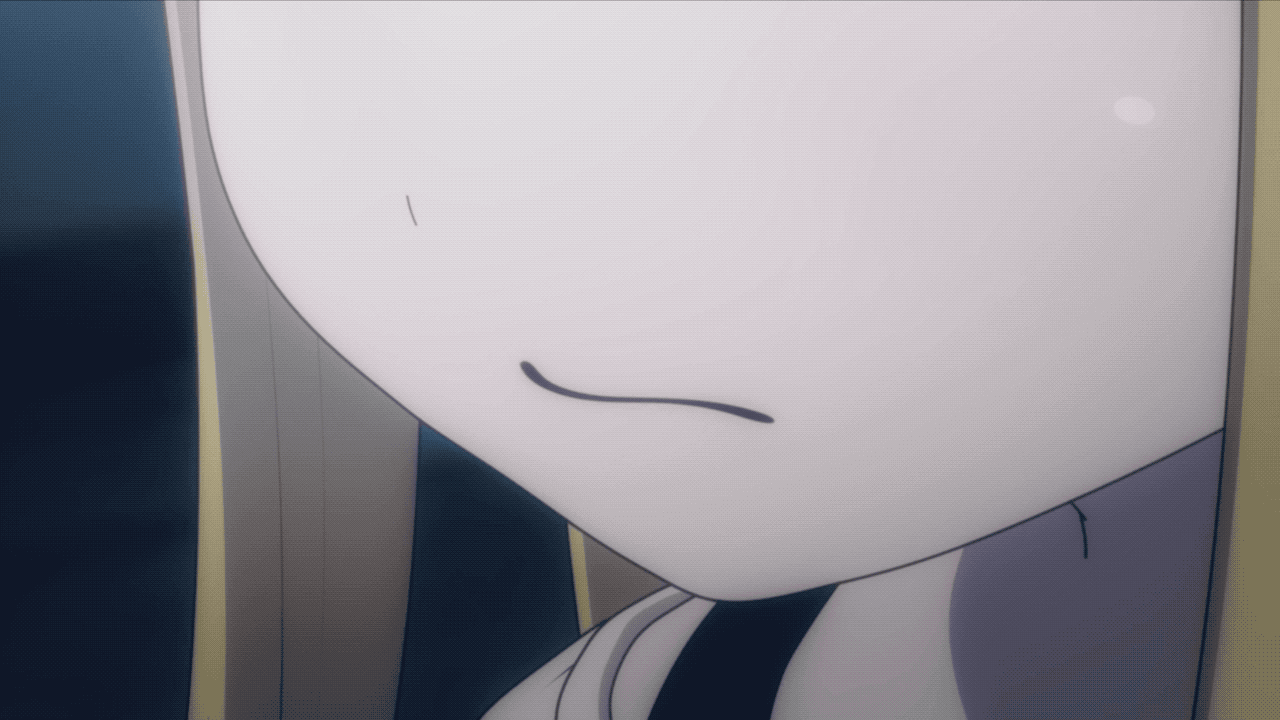Sometimes, I watch the same Netflix scenes over and over. I love languages, and when I hear an interesting phrase, I become immensely curious as to how it’s translated.
Come along with me as we examine the same scene in five different ways!
Last night, I became incredibly obsessed with a twenty-second clip from a Netflix romcom anime Hi Score Girl, from S1E12. No plot lines are spoiled.
Here it is in the original Japanese.
Japanese knowledge isn’t required; given the colors, ominous music, and close-up shots…
…you can tell something sad is unfolding. Hidaka, the girl, says something. Haruo, the boy nervously replies. She says something, he replies again.
An entire world of meaning is in that final close-up of her mouth as she whispers: “a, sou”

(All following translations are my own, and rough ✌🏽 (I should also note that I have nothing but the utmost respect for VAs and subbers. All of the following tweets are just my thoughts ✌🏽))
A translation could be:
sugu chikaku dakara ii noni I’ll be nearby soon, so it’s fine.
iyaiya Nah, it’s cool.
konnya wa hanabitaikai nan da yone Tonight is the fireworks festival, isn’t it?
un, maa, ore wa zenzen kyoumi ga nai Yeah, uh, I have absolutely no interest in that.
Then:「あ そう」
“A, sou”
Yeah, of course.
“Sou” could be used as a way of saying “that’s right/correct.”
More accurately–and here’s where it gets wacky!–is that you could also say “sou” when you’re being polite and already know the answer.
If someone told you, “It’s going to rain today!” and you can see the clouds are gray and the smell of wet wind is in the air you still reply with “It does look that way,” acknowledging what they said.
“Sou” captures a feeling: one person agreeing with another’s stated fact.
For more context, you can also use it as a respectful questioning – “Is that right?” or “You don’t say?” You’re not challenging their fact, you’re respecting their knowledge.
It’s purely humbling and not at all sarcastic, the exact opposite of what this face implies.

When Haruo says “I’m not interested” and Hidaka simply replies “sou,” I interpret it to mean “Oh, yeah. That’s right. Of course you wouldn’t be interested in those things, what else should I have expected.”
In English, you might reply to something with “Yeah, right” and it can be said either as a positive statement (“Ohhhh yeah”) or a sarcastic rebuttal.
I choose to believe that Hidaka is being a little stinker here (which she’s completely right to do so, Haruo is a selfish idiot)
Cue my usual act when encountering something like the word “sou”: I pause Netflix, swap the languages, rewind the scene, and play it again.
Here’s that same scene in English.
(One major difference here is that, due to time constraints, the English audio and text do not match, which gives us two different translations to follow for the price of one.
(Y E S!))
In the first exchange, Hidaka’s spoken and written lines are fine. They capture the original meaning: she lives close by and doesn’t need to be walked home.
Haruo, though… his voice loses that nervous “iyaiya” from the Japanese. He almost sounds resigned. Not bored, but reluctant. His written text is also somewhat brief: “It’s fine.”
Maybe this could’ve had a “whatever” attached on to show how unbothered he is by this “duty”?
The fireworks conversation, in voice and text, is flawless. Haruo’s voice accurately captures his near disgust at the activity. He completely treats Hidaka as an ignorable presence.
Let’s look at text translation of “sou” first: “Ah, I see.” This is a harshly literal translation. A better one that captures the original (and Haruo’s surprise at her uncharacteristic “rudeness”) could be “Of course not.”
Her voice nails her feelings, though. The word “Yeah” can convey a much deeper feeling from how it’s sounded it out than if you just read the word.
You can hear her heart break as she realizes this guy isn’t going to take her out on a date.
The next language to interpret is in Spanish. Same fun bonus here–two translations for one. Hooray!
Unlike the English, the differences between the sound and the text are very frustrating here. But I can understand why each choice was made.
Hidaka: Ya voy más que vivimos muy cerca.
“I’m going, though we live close to each other.”
This misses the Japanese and English confidence that she carries in herself. Yes, they live close by, and she doesn’t want or need Haruo. In Japanese she literally says “it’s all good.”
Here in Spanish, she’s simply stating a fact and narrating what they are doing.
But her TEXT translates as follows: “You don’t need to accompany me. I live close.”
Perfect! It captures the Japanese more precisely. Hidaka says she lives close by, & doesn’t include Haruo’s relation to her at all. She cuts him out. The difference between vivimos & vivo. No we.
Haruo: Sí, tienes razón
Ehhh… this is such a weird reply. It translates maybe as “Yeah, you’ve got a point.” Which is a pretty rude thing to tell someone when they’re just making small talk about the distance between their homes.
But again, the text absolutely nails it with “está bien”, which is a much more casual way of brushing off the walk. He’s saying “it’s all good” here versus “yeah you are right.”
Consider if it had been something like “no hay problema,” an even larger mistake.
There’s a big difference between “it’s fine” and “it’s not a problem.” Only the first choice is best for “iyaiya.” Calling something “not a problem” implies that the speaker assumes the listener thinks there was a problem, which is more bad etiquette.
Hidaka: Mira, ya empezó festival
A unique observation in the Spanish: “The festival’s already started.” They reduced some of her coyness, which is a shame. She’s quite precise now.
I will say her excited “mira/look!” did get me to notice the subtle rumble of distant fireworks.
Hidaka is speaking so stiffly here, again, just stating a fact. Instead of playing dumb (“the festival’s going to start, isn’t it?”) she knows the precise timeline of it. It’s as if she’s moments away from asking if he wants to go. Too bold a move for her character.
Hidaka’s subtitles, though, are straight up from the original Japanese, even cleverly swapping “ね/ne” for ¿no?
That’s great. She knows the festival is tonight, but she wants to coax some excitement out of Haruo for it.
Haruo: Sí, aunque no me gusta mucho esas cosas
This is REALLY great: “Yeah, though I don’t really like those things much.” Haruo used “興味/kyoumi/interest” & refers specifically to Hidaka’s mention of the festival.
“estas cosas/those things” captures that dismissive attitude.
His Spanish text falters for the first time: “no me interesa/ it doesn’t interest me.” It’s okay, but it could be better.
All languages miss the finality of “全然/zenzen/whatsoever.” No interest, at all. “nunca me gustó” might more clearly express the absolutely zero passion.
Hidaka: Sí, entiendo.
Just as in English, it’s Hidaka’s voice that captures better what her words do not: “Yes, I understand.” She has a pissed tone in this language. But I think the word entiendo itself is another erroneous example of her stiffness.
I think “claro” could be substituted here, which has a closer connotation to English’s sweet-and-sour “Of course.”
“It’s going to rain today.” “Of course!” Claro: it’s an obvious fact because the clouds are gray. Entiendo’s usage makes it come off as a harsher “Yeah, I know.”
Her “ya veo” subtitle is a much better choice. Literally “I see,” it could be taken to also be “Now I get it. Now I understand.”
Hidaka realizing now en español that she’s not getting that fireworks date.
Of the four translations, I think the good and less good formatting of how the “sou” sentiment is at least expressed consistently, given how the characters lines are all shaped immediately prior.
Hidaka is either reserved, speaking nonchalantly, then seething with anger.
Or she’s being polite, acting coy, then depressed she can’t get Haruo’s attention.
In twenty seconds, we follow her thoughts and feelings along a slow, sad arc. All expressed with one melancholic “sou”